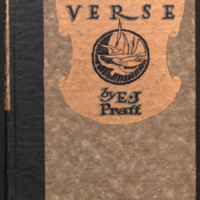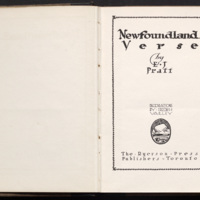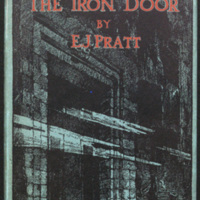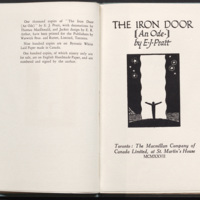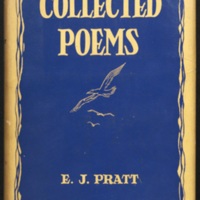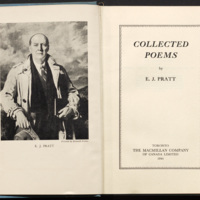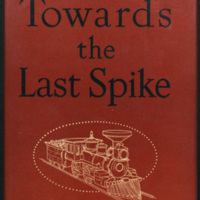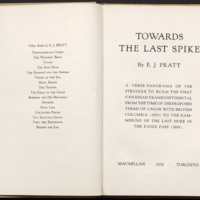2
E.J. Pratt: Canada's National Poet
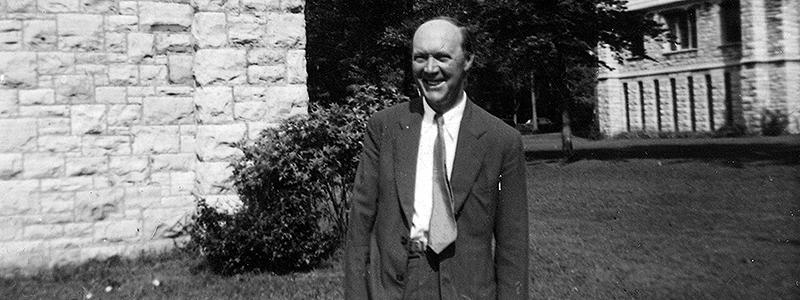
Collections of poetry by Edwin John Dove Pratt (1882–1964), arranged chronologically by the date of publication. Pratt was born in Western Bay, Newfoundland. He won the Governor General’s Medal for The Fable of the Goats and Other Poems (Macmillan Company of Canada Limited, 1937), Brébeuf and His Brethren (1940), and Towards the Last Spike (Macmillan Company of Canada Limited, 1952). The poet was also awarded the Lorne Pierce Gold Medal for distinguished services to Canadian literature, the Canada Council medal for distinction in literature (1961), and many more.
Victoria University Library holds the E.J. Pratt fonds, consisting of Pratt's records, pertaining to his activities as a teacher, minister and poet. It contains manuscripts and published works by E.J. Pratt, as well as notebooks, drafts of poems, lecture notes, letters, critical works and theses, photographs and memorabilia.
Victoria University Library holds the E.J. Pratt fonds, consisting of Pratt's records, pertaining to his activities as a teacher, minister and poet. It contains manuscripts and published works by E.J. Pratt, as well as notebooks, drafts of poems, lecture notes, letters, critical works and theses, photographs and memorabilia.
Newfoundland Verse
Pratt, E. J. (Edwin John), 1882–1964
Ryerson Press, 1923
Title
Newfoundland Verse
Description
Newfoundland Verse was published on April 2, 1923 by Ryerson Press. Lorne Pierce (1890–1961), emerging as an influential book editor in Canadian publishing, encouraged Pratt to refine his poetic voice and style. Pierce was responsible for the selection of the poems included in the collection: "The Ground Swell," "The Shark," "The Fog," "The Drowning," "Newfoundland," and "Come Not the Seasons Here." They are recognized as some of the finest verses among Pratt's poems.
The book is illustrated with decorations by Frederick Horsman Varley (1881–1969), a painter and a member of the Group of Seven. Pratt guided Varley in the style of the illustrations.
The book is illustrated with decorations by Frederick Horsman Varley (1881–1969), a painter and a member of the Group of Seven. Pratt guided Varley in the style of the illustrations.
Creator
Pratt, E. J. (Edwin John), 1882–1964
Source
E.J. Pratt
Publisher
Ryerson Press
Date
1923
Contributor
Varley, Frederick Horsman, 1881–1969
Identifier
PR6031 .R3 N4
+ more details
The Iron Door: An Ode
Pratt, E. J. (Edwin John), 1882–1964
Macmillan Company of Canada Limited, 1927
Title
The Iron Door: An Ode
Description
The Iron Door is a poem about the death of Pratt's mother, Fanny Knight Pratt in 1926. The poet composed it to obtain "some relief to my bewilderment" he experienced following her passing, and to explore his feelings on the nature of immortality.
Lorne Pierce (1890–1961), the editor at Ryerson Press assisted Pratt with the composition of two important stanzas in the poem. Pierce's influence on Pratt's life and work also extended to the realm of friendship. As former Methodist clergymen, both men struggled with religious doubt and held a series of conversation on the nature of religious beliefs.
The book is decorated with illustrations by Thoreau MacDonald (1901–1989), a painter, illustrator, and designer.
Lorne Pierce (1890–1961), the editor at Ryerson Press assisted Pratt with the composition of two important stanzas in the poem. Pierce's influence on Pratt's life and work also extended to the realm of friendship. As former Methodist clergymen, both men struggled with religious doubt and held a series of conversation on the nature of religious beliefs.
The book is decorated with illustrations by Thoreau MacDonald (1901–1989), a painter, illustrator, and designer.
Creator
Pratt, E. J. (Edwin John), 1882–1964
Source
E.J. Pratt
Publisher
Macmillan Company of Canada Limited
Date
1927
Contributor
MacDonald, Thoreau, 1901–1989, illustrator
Identifier
PR6031 .R3 I7 1927
+ more details
Collected Poems
Pratt, E. J. (Edwin John), 1882–1964
Macmillan Company of Canada Limited, 1944
Title
Collected Poems
Description
Pratt served as his own editor in selecting the verses published as Collected Poems. The collection comprises his long poems, including "The Witches' Brew" and "Dunkirk." Pratt decided to omit the short poems, especially the works published in Newfoundland Verse (Ryerson Press, 1923, his second book of poetry), judging them as appearing "somewhat immature" in retrospective.
This copy contains a long inscription by the poets on the front endpaper.
This copy contains a long inscription by the poets on the front endpaper.
Creator
Pratt, E. J. (Edwin John), 1882–1964
Source
E.J. Pratt
Publisher
Macmillan Company of Canada Limited
Date
1944
Rights
Public domain
Identifier
PR6031 .R3 A17 1944
+ more details
Towards the Last Spike: A Verse-Panorama of the Struggle to Build the First Canadian Transcontinental from the Time of the Proposed Terms of Union with British Columbia, 1870, to the Hammering of the Last Spike in the Eagle Pass, 1885
Pratt, E. J. (Edwin John), 1882–1964
Macmillan Company of Canada Limited, 1952
Title
Towards the Last Spike: A Verse-Panorama of the Struggle to Build the First Canadian Transcontinental from the Time of the Proposed Terms of Union with British Columbia, 1870, to the Hammering of the Last Spike in the Eagle Pass, 1885
Description
Towards the Last Spike chronicles the political debates and the five-year effort to construct a transcontinental line, the Canadian Pacific Railway. Prior to composing any poem, Pratt immersed himself in research. While studying the historical and political context of the CPR project, he concluded that it was not only a technological accomplishment, but political one as well: "I've come to a conclusion that the C.P.R. was built not so much by the chaps who did the technical and physical work, indispensable as they were, but by fellows with the gift of the gab, the talkers, and the wranglers and the argufiers... In the beginning was the Word—and so to the end, to the last spike." The book received the Governor General’s Award in 1952.
The poems depicts the construction of the railway as a force for national unity. The "last spike" was the final railway spike driven at the end of the CPR line by Donald Smith, the company president, on November 7, 1885, marking the end of its completion. Although a small, unpretentious ceremony was held commemorate the event, the last spike symbolizes the realization of national unity within the Dominion of Canada, linked from coast to coast.
The poems depicts the construction of the railway as a force for national unity. The "last spike" was the final railway spike driven at the end of the CPR line by Donald Smith, the company president, on November 7, 1885, marking the end of its completion. Although a small, unpretentious ceremony was held commemorate the event, the last spike symbolizes the realization of national unity within the Dominion of Canada, linked from coast to coast.
Creator
Pratt, E. J. (Edwin John), 1882–1964
Source
E.J. Pratt
Publisher
Macmillan Company of Canada Limited
Date
1952
Subject
Canadian Pacific Railway Company—Poetry
Identifier
PR6031 .R3 T6
+ more details

